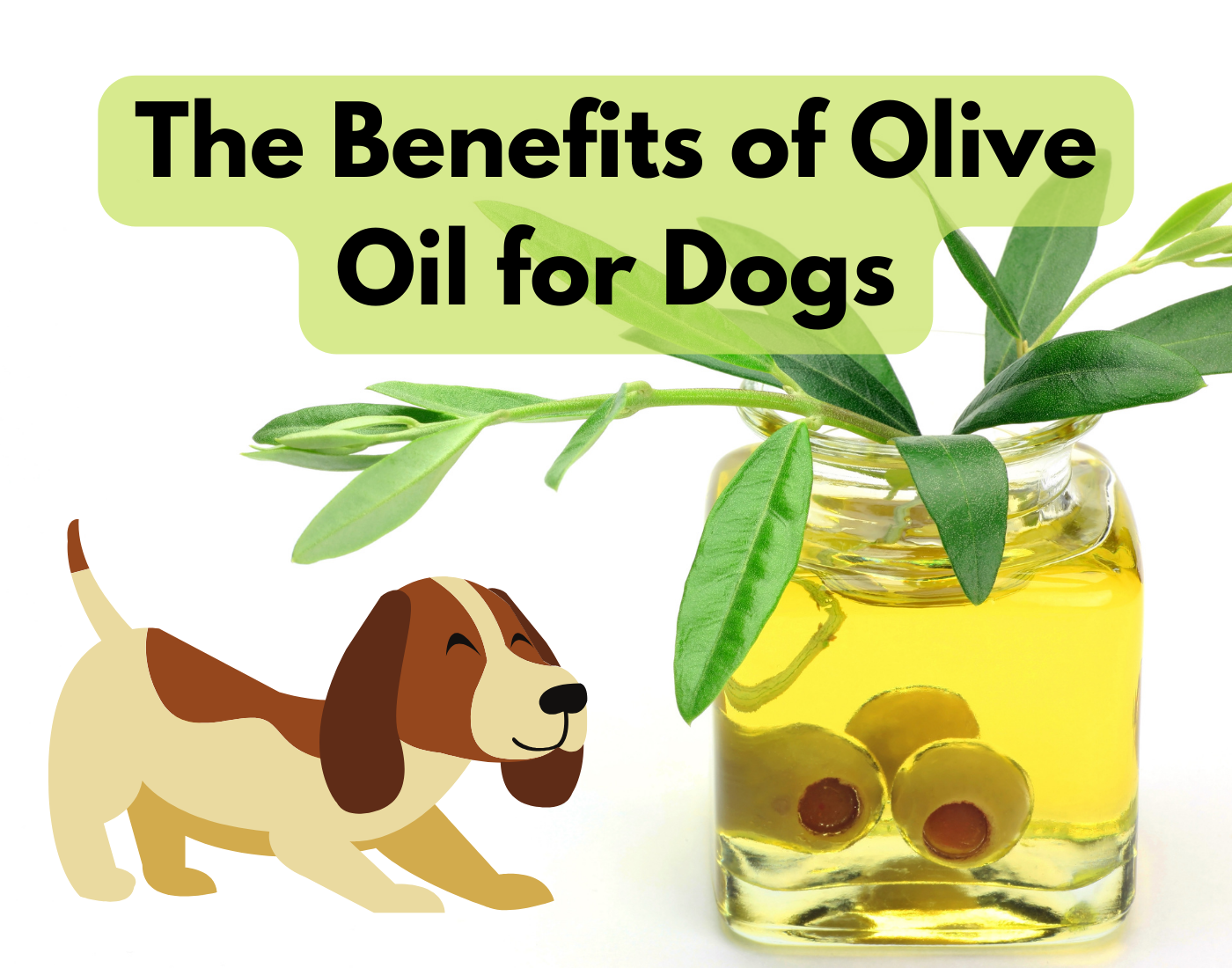
Olive oil is one of the healthiest oils on earth; but can a dog eat olive oil, is olive oil safe for dogs, or are there any benefits of olive oil for dogs?
Yes, dogs can eat olive oil, for many good reasons. It’s a great source of monounsaturated fats, antioxidants, and omega-3 and omega-6 fatty acids. It reduces the risk of cancer and cardiovascular diseases and improves joint mobility.
Hence, olive oil’s health benefits for dogs are well documented. Read on to learn more about olive oil’s potential benefits for dogs and other related questions.
Contents
Olive oil Composition- Let’s Know First
Contrary to popular belief, some types of dietary fat are healthy. Indeed, they’re essential to give our bodies energy and support cell function.
There are four types of dietary fat:
- Saturated fats
- Trans fats
- Monounsaturated fats
- Polyunsaturated fats
Out of these, only the first two are potential health risks. Typically, saturated and trans fats are solid at room temperature and raise cholesterol levels in the blood. However, saturated fats are not harmful unless taken in excess amounts. On the other hand, monounsaturated and polyunsaturated fats lower blood cholesterol levels.
Olive oil comprises 75% monounsaturated fat, only 13% saturated fat, and 12% polyunsaturated fat. Considering the composition, it becomes a no-brainer to understand that olive oil is rich in healthy fatty acids and is almost devoid of any harmful fat.
Olive oil Benefits- Benefits of Extra Virgin Olive Oil for Dogs
Time is to stop thinking,” is olive oil good for dogs?” The reason is, experts agree that olive oil, especially extra virgin olive oil, is beneficial for your pet.
Here are some research-backed, proven benefits of olive oil for dogs.
Rich in Healthy Monounsaturated Fats
A monounsaturated fat called oleic acid makes up about 75% of the total olive oil content. Oleic acid is an omega-9 fatty acid commonly used to prevent heart disease and reduce cancer due to its anti-inflammatory properties. Oleic acid also has beneficial effects on genes related to cancer.
Saturated fat accounts for only 13% of the oil content. The remainder, 12%, consists of polyunsaturated fat, such as omega-6 and omega-3 fatty acids—known for regulating blood pressure and reducing inflammation.
Long story short, monounsaturated fat oleic acid accounts for a significant chunk of the total oil content.
Rich in antioxidants
Not only is olive oil a great source of beneficial fatty acids and Vitamin E and K, but it’s also loaded with powerful antioxidants.
Biologically active antioxidants found in olive oil prevent your dog from the risk of chronic diseases by counteracting oxidative stress waged by free radicals. Studies suggest that antioxidants like vitamin E in olive oil protect cell membranes in dogs and cats from oxidative damage by free radicals.
Chronic oxidative stress produced by free radicals can lead your dog to develop chronic diseases, such as heart disease and cancer. However, antioxidants found in olive oil fight inflammation and prevent blood cholesterol oxidation, lowering your pet’s risk of heart disease.
In most instances, antioxidants act as reducing agents to neutralize the oxidative damage caused by free radicals.
Helps Develop a Healthy Coat
Olive oil includes phytonutrients, vitamin E, and omega-3 fatty acids that are beneficial for your dog’s skin and coat. These olive oil constituents add shine and strength to your pet’s coat and keep its skin moisturized and well-nourished. Antioxidants and other phytochemicals in olive oil also help repair your dog’s skin.
These olive oil ingredients work internally at the cellular level—therefore—add olive oil to your dog’s diet instead of rubbing it on the pet’s hair.
Can you apply olive oil to your dog’s coat?
Applying olive oil to your dog’s coat has two clear disadvantages. First, the hair you see on your dog’s skin isn’t alive anymore. If you apply olive oil on your dog’s fur or coat, the only thing you’ll end up doing is wasting your time and a couple of tablespoons of oil.
Second, olive oil is delicious, and, most probably, your dog will lick it off. It’s often counterproductive because licking in dogs leads to localized itchiness, hair loss, and even bald spots.
How should you use olive oil for your dog shedding problem and healthy skin?
For better results, you should apply olive oil on your dog’s skin—not hair—as only the outer, visible portion of hair is dead. So the entire hair shaft isn’t composed of dead cells. Similarly, hair follicles are living organs actively nourished by blood vessels.
Massaging your dog’s skin with olive oil, especially a few hours before bathing, is a great way to nourish the skin and improve blood circulation. It also helps with flaky skin and manages dandruff.
Phytochemicals and antioxidants found in olive oil also help manage your dog’s shedding problem. It strengthens your dog’s hair follicles—the outcome being firm, healthy skin, and less shedding.
Helps Control Weight
Researchers have established a correlation between olive oil and weight loss in humans, and there’s no reason to believe that the same doesn’t apply to dogs. Any extra pound can put stress on your dog’s joints. Olive oil has excellent anti-inflammatory properties and contains biologically active antioxidants.
Olive oil helps lower your dog’s bad LDL (low-density lipoprotein) cholesterol, significantly contributing to weight loss.
Spanish researchers have found that consuming olive oil in excess doesn’t lead to weight gain, despite its high-calorie nutrient profile. That being said, consuming a lot of olive oil isn’t healthy for your dogs for other reasons discussed at the end of this article.
Boosts the Immune System
Studies have shown that polyphenols and carotenoids, two plant-based molecules found abundantly in olive oil, regulate or enhance the immune system in humans.
Humans’ and dogs’ immune systems primarily consist of white blood cells, antibodies, and other substances that fight infections (microbes) and foreign proteins. For this reason, you can’t help to believe that olive oil boosts the dog’s immune system.
Staves off Cognitive Decline
Antioxidants in olive oil fight free radicals attacking your dog’s cell membranes and counteract the effects produced by them. By fighting free radicals, olive oil antioxidants prevent over-oxidation of these membranes, the resultant tissue damage, and diseases like dementia that arise consequently.
Most studies on olive oil’s effects on cognitive decline and other conditions have been conducted on humans and other animals. However, it’s thought that the benefits of olive oil are similar for dogs that suffer from Canine Cognitive Dysfunction (CCD), commonly called dog’s dementia.
Dog dementia is a form of cognitive decline in dogs with effects similar to Alzheimer’s’ in humans. It’s a geriatric disease in dogs that affects a canine’s behavior and involves impairments related to memory, learning, and comprehension.
One of the key features of Alzheimer’s disease in humans is a buildup of beta-amyloid plaques inside the brain cells. A study in mice shows that a substance in olive can help remove this buildup. Since the two diseases—one of the humans and another occurring in aging dogs—are related, olive oil certainly provides a similar benefit for dogs.
Helps to Treat Ear Infections
Olive oil contains many nutrients with very effective antibacterial properties. If your dog has a mild ear infection, you can use olive oil to treat it.
Gently warm a dropper of olive oil in hot water and pour a few drops into your pet’s ears. Rub the ears to make sure that the oil goes well inside. Remove debris or excess fat by dabbing your dog’s ears with a cotton ball.
Doing so will certainly provide some relief to the suffering pup. In most cases, it will completely cure your dog. If the condition persists or the relief is subtle, it’s better to go to the vet for the correct diagnosis and treatment.
Helps Relieve Constipation in Dogs
Olive oil can effectively treat mild constipation in dogs as it lubricates the digestive tract and eases food passage.
However, olive oil can’t cure a dog of severe constipation as, in this case, it takes longer for the food and liquids to reach the intestines. If your dog is severely constipated, you should immediately contact your veterinarian.
Helps Treat Rheumatoid and other Forms of Arthritis
Olive oil and its derivatives have been demonstrated to benefit osteoarthritis and chondrocytes in animals and humans. That’s because they possess anti-inflammatory, antioxidant, and autophagy enhancing activities, thanks to their polyphenol content. Many in vitro studies have found that olive polyphenols’ anti-inflammatory properties contribute to the chondroprotective effects of olive oil.
Similarly, rheumatoid arthritis is an autoimmune disease characterized by joint stiffness, deformation, and pain. The exact cause of the illness remains unknown, but it involves the immune system attacking normal body cells by mistake. The disease affects both animals and humans in an almost similar fashion. Most dogs develop the disorder as they age.
In human clinical trials, olive oil supplements reduce inflammation and oxidative stress in patients with rheumatoid arthritis.
A combination of fish oil and olive oil is perfect for improving joint stress and reducing stiffness.
Potential Risks of Olive Oil for Dogs
No matter how healthy a supplement is for your pet, overdosing can lead to severe problems. Contrary to popular belief, even though olive oil is rich in calories, research shows that olive oil doesn’t lead to weight gain even if consumed in excess, thanks to its predominant healthy fat content and antioxidant and anti-inflammatory properties.
That being said, dogs and humans are evolutionarily distinct. Moreover, most research on olive oil has been conducted regarding humans. There are very few studies about the effects of olive oil on dogs.
For these reasons, you should always be careful while administering olive oil to your pet and keep these pointers in mind:
Vomiting
Vomiting in dogs mainly occurs due to dietary indiscretion. However, it can also be a symptom of a serious, even life-threatening condition. But olive oil doesn’t lead to a severe problem even when consumed in a large amount. So the latter scenario is ruled out.
Some dog owners report their dogs started to vomit after consuming olive oil. The situation arises by introducing olive oil in excess to a pet’s diet that hasn’t eaten it before or has an already unsettled stomach.
When introducing olive oil to your dog’s diet, start with a minimal dosage and gradually increase it to avoid unwanted symptoms.
Diarrhea
Olive oil has laxative properties, and a high amount of it can lead to gastrointestinal disorders, usually diarrhea, due to its high-fat content. If you see an occasional loose stool, don’t panic and cut down on the dosage or discontinue it together for a few days. When your dog’s stomach is settled, start introducing olive oil slowly to your puppy’s food.
FAQs
Can I give my dog olive oil every day?
Yes, you can give olive oil to your dog every day but in moderate amounts. Health perks of olive oil are obvious if dogs eat olive too much, as these are for humans.
Some people report that their dogs developed diarrhea after adding olive oil excessively to their dog’s diet. If your dog develops loose stools, withdraw olive oil from his diet and then start by slowly incorporating it into your pet’s meals.
How much olive oil should I give my dog?
One teaspoon of olive oil per 20 kg of body weight is a moderate, optimum dose for most dog breeds. However, you can increase or decrease the amount based on your dog’s responsiveness and susceptibility/sensitivity.
Does olive oil help itchy dogs?
Yes, olive oil is an excellent remedy for itchy dogs with dry, flaky skin. It acts as a natural moisturizer to your dog’s skin—even when ingested orally—as it fulfills your dog’s healthy fat requirements.
It renders your dog almost immune to mild skin diseases and helps the skin produce sebum, an oily substance produced by the skin to balance its tone and keep external germs at bay—not letting them enter your dog’s skin. Olive oil also helps your dog combat sensitivity to high pH shampoos and adjust to hormonal changes.
Can I mix olive oil with oil for my dog?
Yes, mixing olive oil with fish oil is a great way to boost individual oil’s benefits. The two oils provide almost similar benefits. However, remember to use only extra virgin olive oil for better results. Similarly, the fish oil you intend to use must be fresh and come from a trusted manufacturer as it can quickly go rancid.
Final Verdict
It’s safe if dogs eat olive oil, and olive oil and extra virgin olive are highly beneficial for dogs’ health. However, too much olive oil can be harmful to your dog.
doglover.biz is a participant in the Amazon Associate program and will earn from qualifying purchases.


